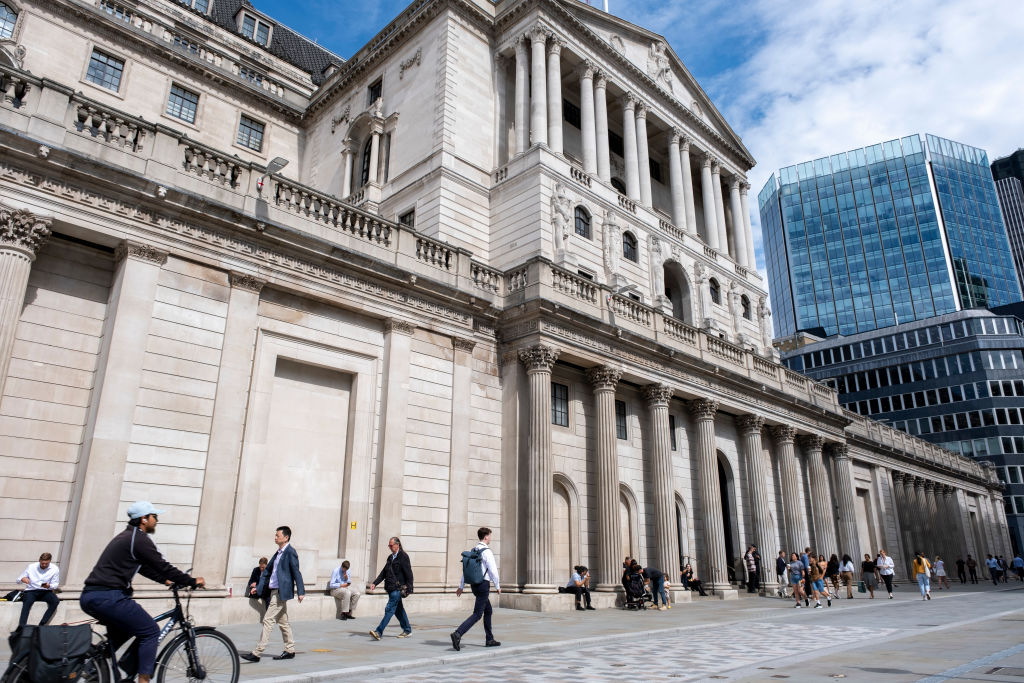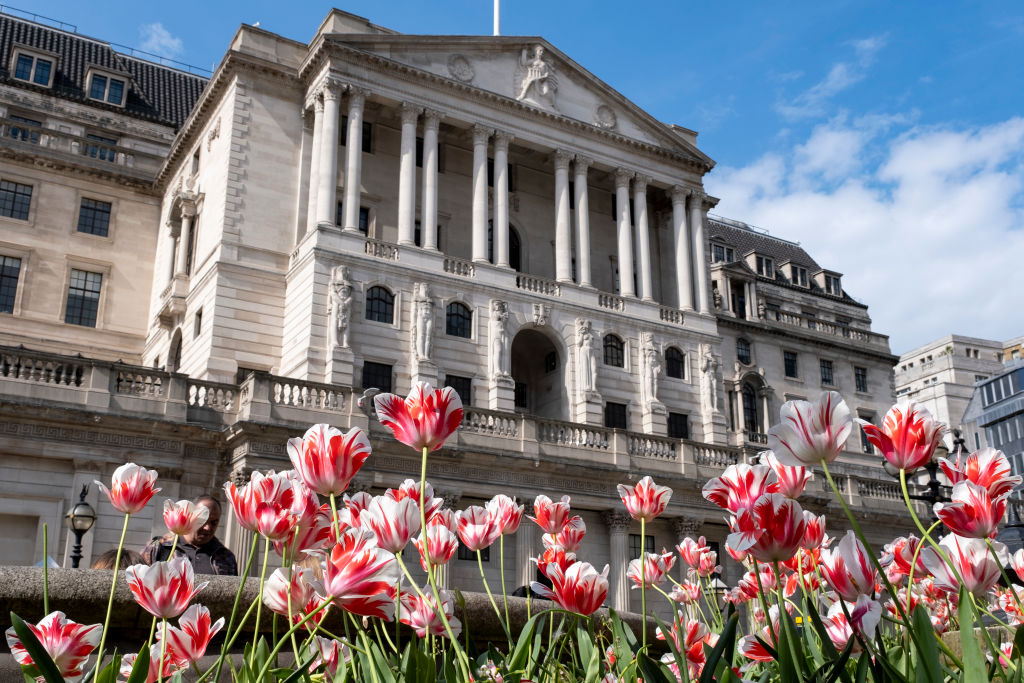Keeping up with the Bank of England – how rates and inflation impact your finances
Ignorance is not bliss when it comes to your personal finances. Here’s why you should follow what the Bank of England is up to.


Get the latest financial news, insights and expert analysis from our award-winning MoneyWeek team, to help you understand what really matters when it comes to your finances.
You are now subscribed
Your newsletter sign-up was successful
Want to add more newsletters?

Twice daily
MoneyWeek
Get the latest financial news, insights and expert analysis from our award-winning MoneyWeek team, to help you understand what really matters when it comes to your finances.

Four times a week
Look After My Bills
Sign up to our free money-saving newsletter, filled with the latest news and expert advice to help you find the best tips and deals for managing your bills. Start saving today!
You’ve heard of keeping up with the Kardashians but, when it comes to your personal finances, the real influencers you want to be watching are the Bank of England policymakers. Let’s call it monitoring the Monetary Policy Committee (MPC).
The Bank of England sets interest rates in an attempt to control inflation and promote economic growth. All of these things play a vital role in dictating the health of your finances. But the latest data suggests a worrying proportion of the population is out of touch when it comes to the state of the UK economy.
According to the latest inflation attitudes survey from the Bank of England (conducted in August), most people thought the current inflation rate was 5.2%. In fact, it is considerably lower at 2.2%.
MoneyWeek
Subscribe to MoneyWeek today and get your first six magazine issues absolutely FREE

Sign up to Money Morning
Don't miss the latest investment and personal finances news, market analysis, plus money-saving tips with our free twice-daily newsletter
Don't miss the latest investment and personal finances news, market analysis, plus money-saving tips with our free twice-daily newsletter
Meanwhile, 29% of respondents said they expect interest rates to rise over the next 12 months when, in fact, most experts agree they are on a downward trajectory after the Bank of England started cutting interest rates from their sixteen-year high last month.
“There’s no reason why absolutely everyone should be completely across inflation and interest rates on a daily basis. People have a lot going on, and sometimes keeping abreast of financial changes falls off the to-do list,” says Sarah Coles, head of personal finance at Hargreaves Lansdown.
“However, if you're saving, borrowing or investing, it’s worth making a date to check in once every few months, to make sure these things haven’t been quietly shifting while you were otherwise occupied,” she adds.
Inflation impacts the value of your savings and investments, while interest rates influence day-to-day costs like how much you are paying on your mortgage. As such, failing to keep up with the latest developments could leave you thousands of pounds out of pocket.
What’s the latest on UK interest rates and why is this information important?
The Bank of England cut interest rates for the first time in over four years on 1 August, bringing the base rate to 5%. This had important implications for savings rates, mortgage rates, house prices and investment markets.
Savings rates have been falling for several months now in anticipation of cuts to the Bank of England base rate, and they tumbled further after the Bank of England’s decision last month.
Knowing where interest rates are at (and where they could be heading next) can help you make important decisions about where best to put your money.
Some of the top savings accounts are still offering rates of around 5%, but these deals aren’t sticking around for long and savers might want to think about locking some money away in a fixed-rate savings account, if they don’t need to access the money in the short term.
Meanwhile, if you are thinking about buying a house or you need to remortgage soon, knowing where interest rates are heading could help you answer important questions like: “Should I fix my mortgage for two years or five years?”
Mortgage rates have been tumbling in recent weeks, creating good opportunities for those who keep up to date with the latest market developments. “The high street giants have announced another raft of cuts this week, and there are now fixed-rate deals charging less than 4%,” Coles points out.
The close link between interest rates and mortgage rates means MPC decisions have an important bearing on the UK property market too. Earlier this month, Amanda Bryden, head of mortgages at Halifax, said that “prospective homebuyers are feeling more confident thanks to easing interest rates”.
This is gradually translating into house prices which were up 4.3% annually in August, according to the latest Halifax House Price Index.
Interest rates also have an important bearing on investment markets, so it is important to stay up to date if you are thinking about which investments to add to your pension or stocks and shares ISA. See our recent feature: “Where to invest as interest rates fall”.
The Bank of England will meet this week to make its next interest rate decision.
How does inflation impact your finances?
Inflation might be a quiet thief, but it is one of the biggest wealth destroyers. Imagine you had £1,000 stashed under the bed (a terrible idea, by the way). Even if inflation were to sit at around 2%, it would only take 36 years for the value of your nest egg to halve.
Of course, over the past few years, the rate of inflation has been far higher than this. UK inflation peaked at 11.1% in October 2022. At this elevated level, it would only take around six years for the value of your money to halve.
The good news is that many savings accounts are now offering real returns – but you need to stay on top of the latest economic news to know whether your provider is giving you a good deal. If you aren’t earning a competitive rate, now is the time to switch. This is particularly important if your rate isn’t even beating inflation.
Knowing the rate of inflation (and the outlook going forward) is important from a budgeting perspective as well. It can help you calculate how much your regular outgoings are likely to change in the near future.
This will influence how much you are able to save and how much you will need to earn to cover the essentials. If costs are going up, it might be reasonable to have a conversation with your employer about whether salaries are likely to increase in line with inflation too.
Understanding the rate and impact of inflation is also important if you are an investor, as some investments are more sensitive to inflation than others. For example, gold is often heralded as an asset that retains its value well. Equities can also be a good hedge against inflation in some instances, while assets like bonds and cash don’t tend to do so well.
Get the latest financial news, insights and expert analysis from our award-winning MoneyWeek team, to help you understand what really matters when it comes to your finances.
Katie has a background in investment writing and is interested in everything to do with personal finance, politics, and investing. She previously worked at MoneyWeek and Invesco.
-
 Should you buy an active ETF?
Should you buy an active ETF?ETFs are often mischaracterised as passive products, but they can be a convenient way to add active management to your portfolio
-
 Power up your pension before 5 April – easy ways to save before the tax year end
Power up your pension before 5 April – easy ways to save before the tax year endWith the end of the tax year looming, pension savers currently have a window to review and maximise what’s going into their retirement funds – we look at how
-
 Why Scotland's proposed government bonds are a terrible investment
Why Scotland's proposed government bonds are a terrible investmentOpinion Politicians in Scotland pushing for “kilts” think it will strengthen the case for independence and boost financial credibility. It's more likely to backfire
-
 How have central banks evolved in the last century – and are they still fit for purpose?
How have central banks evolved in the last century – and are they still fit for purpose?The rise to power and dominance of the central banks has been a key theme in MoneyWeek in its 25 years. Has their rule been benign?
-
 UK to have highest inflation among advanced economies this year and next, says IMF
UK to have highest inflation among advanced economies this year and next, says IMFThe International Monetary Fund (IMF) says it expects inflation to remain high in the UK, while lowering economic growth forecasts for 2026.
-
 Is Britain heading for a big debt crisis?
Is Britain heading for a big debt crisis?Opinion Things are not yet as bad as some reports have claimed. But they sure aren’t rosy either, says Julian Jessop
-
 'Britain is on the road to nowhere under Labour'
'Britain is on the road to nowhere under Labour'Opinion Britain's economy will shake off its torpor and grow robustly, but not under Keir Starmer's leadership, says Max King
-
 'Governments are launching an assault on the independence of central banks'
'Governments are launching an assault on the independence of central banks'Opinion Say goodbye to the era of central bank orthodoxy and hello to the new era of central bank dependency, says Jeremy McKeown
-
 Why investors can no longer trust traditional statistical indicators
Why investors can no longer trust traditional statistical indicatorsOpinion The statistical indicators and data investors have relied on for decades are no longer fit for purpose. It's time to move on, says Helen Thomas
-
 Live: Bank of England holds UK interest rates at 4.5%
Live: Bank of England holds UK interest rates at 4.5%The Bank of England voted to hold UK interest rates at their current level of 4.5% in March, as widely anticipated, after inflation rose to 3% in January
